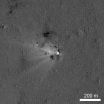Animal study suggests heavy drinking in adolescence associated with lasting brain changes
High alcohol use during adolescence may compromise developing brain
2014-10-28
(Press-News.org) WASHINGTON, DC — Heavy drinking during adolescence may lead to structural changes in the brain and memory deficits that persist into adulthood, according to an animal study published October 29 in The Journal of Neuroscience. The study found that, even as adults, rats given daily access to alcohol during adolescence had reduced levels of myelin — the fatty coating on nerve fibers that accelerates the transmission of electrical signals between neurons. These changes were observed in a brain region important in reasoning and decision-making. Animals that were the heaviest drinkers also performed worse on a memory test later in adulthood. The findings suggest that high doses of alcohol during adolescence may continue to affect the brain even after drinking stops. Further research is required to determine the applicability of these findings to humans.
According to the World Health Organization, a growing number of adolescents and young adults around the world engage in binge drinking, the consumption of four (five for men) or more drinks over approximately two hours. Previous research in humans has shown an association between heavy episodic (binge) drinking in adolescence, changes in myelin in several brain regions, and cognitive impairments in adulthood. However, it was unknown whether alcohol was behind these brain and behavioral differences or if predisposing factors could explain the findings.
In this study, Heather Richardson, PhD, her graduate student Wanette Vargas, BA, and colleagues at the University of Massachusetts, Amherst, compared myelin in the prefrontal cortex — an area of the brain that is vital to reasoning and decision-making — in young male rats given daily access to either sweetened alcohol or sweetened water for two weeks. Animals that drank alcohol as adolescents had reduced myelin levels in the prefrontal cortex compared with those that drank a similar amount of sweetened water. When the researchers examined the alcohol-exposed animals several months later, they found that the animals continued to display reduced myelin levels as adults.
"Our study provides novel data demonstrating that alcohol drinking early in adolescence causes lasting myelin deficits in the prefrontal cortex," Richardson said. "These findings suggest that alcohol may negatively affect brain development in humans and have long-term consequences on areas of the brain that are important for controlling impulses and making decisions."
The researchers also examined how adult animals that binged on alcohol as adolescents performed on a test to assess working memory, the ability to hold on to information for a short period. The more alcohol the rats consumed over the two-week period as adolescents, the worse they performed on the working memory task as adults.
"This study suggests that exposure to high doses of alcohol during adolescence could exert lingering, if not permanent, damage to selective brain fibers," said Edith Sullivan, PhD, who studies the effects of alcohol on brain function at Stanford University and was not involved with this study. "This damage might underlie persistent compromise of cognitive functions involved in learning and render youth vulnerable for later development of alcohol use disorders."
INFORMATION:
This research was funded by the National Institute on Alcohol Abuse and Alcoholism.
The Journal of Neuroscience is published by the Society for Neuroscience, an organization of nearly 40,000 basic scientists and clinicians who study the brain and nervous system. Richardson can be reached at hrichardson@cns.umass.edu. More information on alcohol and the teenage brain can be found on BrainFacts.org.
ELSE PRESS RELEASES FROM THIS DATE:
2014-10-28
NASA's Lunar Reconnaissance Orbiter (LRO) spacecraft has spied a new crater on the lunar surface; one made from the impact of NASA's Lunar Atmosphere and Dust Environment Explorer (LADEE) mission.
"The Lunar Reconnaissance Orbiter Camera (LROC) team recently developed a new computer tool to search Narrow Angle Camera (NAC) before and after image pairs for new craters, the LADEE impact event provided a fun test, said Mark Robinson, LROC principal investigator from Arizona State University in Tempe. "As it turns there were several small surface changes found in the predicted ...
2014-10-28
How does a normal cellular process derail and become unhealthy?
A multi-institutional, international team led by Virginia Tech researchers studied cells found in breast and other types of connective tissue and discovered new information about cell transitions that take place during wound healing and cancer.
The results were published in a September issue of the journal Science Signaling.
During development, cells change forms and regroup from tight packs of epithelial cells to more mobile, loose arrays of mesenchymal cells.
The cell changes, known as an epithelial ...
2014-10-28
Montreal, October 28, 2014 – The Montreal Heart Institute Research Centre is once again pushing the limits of knowledge in personalized medicine. A meta-analysis combining the results of several pharmacogenomic studies and involving over 40,000 research subjects now makes it possible to demonstrate a different response to statins according to the patient's gene profile. This important contribution of two Montreal researchers from the Montreal Heart Institute (MHI), Dr. Jean-Claude Tardif, Director of the Research Centre and Dr. Marie-Pierre Dubé, Director of ...
2014-10-28
Fewer women than men are treated with dialysis for end-stage kidney disease, according to a new comprehensive analysis of sex-specific differences in treatment published this week in PLOS Medicine. The results of the study, conducted by Manfred Hecking with Friedrich Port and colleagues from Arbor Research Collaborative for Health in Ann Arbor, Michigan, suggest that these findings call for further detailed study for the reasons underlying the sex-specific differences in end-stage renal disease treatment.
Chronic kidney disease often progresses to end-stage renal disease, ...
2014-10-28
SAN FRANCISCO: A simple intervention designed to raise awareness about the use of communication devices while driving reduced the incidence of distracted driving by 50 percent in hospital personnel, according to findings from a single site study presented today at the 2014 Clinical Congress of the American College of Surgeons.
Driving distracted–caused by any activity that steals a driver's attention from the road–is at an all-time high. In 2012, an estimated 421,000 people were injured in accidents involving distracted driving and 3,328 were killed as a result ...
2014-10-28
A population of endangered giant tortoises, which once dwindled to just over a dozen, has recovered on the Galapagos island of Española, a finding described as "a true story of success and hope in conservation" by the lead author of a study published today (Oct. 28).
Some 40 years after the first captive-bred tortoises were reintroduced to the island by the Galapagos National Park Service, the endemic Española giant tortoises are reproducing and restoring some of the ecological damage caused by feral goats that were brought to the island in the late 19th century. ...
2014-10-28
New Haven, CT, Oct. 28 2014 – Each year, malaria kills over 600,000 people, more than half of them children. In a study published today in PLOS ONE , researchers with the non-profit Innovations for Poverty Action (IPA) and Harvard University found that simple text message reminders to take malaria medication can help in the fight against the disease by boosting the rates at which patients complete their medication regimen.
One challenge in fighting malaria is that the disease has evolved resistance to many drugs that formerly worked, according to Julia Raifman, ...
2014-10-28
This news release is available in German.
In addition to their song, songbirds also have an extensive repertoire of calls. While the species-specific song must be learned as a young bird, most calls are, as in the case of all other birds, innate. Researchers at the Max Planck Institute in Seewiesen have now discovered that in zebra finches the song control system in the brain is also active during simple communication calls. This relationship between unlearned calls and an area of the brain responsible for learned vocalisations is important for understanding the ...
2014-10-28
JUPITER, FL, October 28, 2014 – Scientists from the Florida campus of The Scripps Research Institute (TSRI) have uncovered a major contributor to Huntington's disease, a devastating progressive neurological condition that produces involuntary movements, emotional disturbance and cognitive impairment.
Using an animal model of Huntington's disease, the new study shows that signaling by a specific protein can trigger onset of the disease and lead to exacerbation of symptoms. These findings, published in the October 28, 2014 issue of the journal Science Signaling, offer ...
2014-10-28
A connection between inflammation and cancer has been recognized for over a hundred years. This connection is particularly evident in colon carcinogenesis, because patients with IBD have a higher incidence of colon cancer than the general population. There is increasing evidence that inflammation contributes to the earliest stages of carcinogenesis, namely in the process of cell transformation, where the cell acquires many aspects of cancer characteristics. The observation that IBD and colon cancer incidence rise as nations industrialize suggests that changes in diet and ...
LAST 30 PRESS RELEASES:
[Press-News.org] Animal study suggests heavy drinking in adolescence associated with lasting brain changes
High alcohol use during adolescence may compromise developing brain




